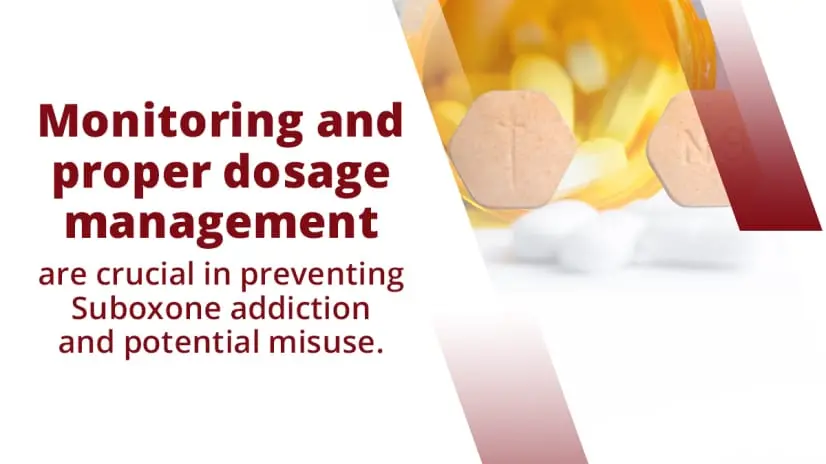
Symptoms of Suboxone Addiction
Clinically Reviewed by:
Suboxone, a medication combining buprenorphine and naloxone, is often prescribed to manage opioid addiction. However, like other substances, it carries a risk of dependence and addiction. Recognizing the symptoms of Suboxone addiction is crucial for timely intervention and support.
Understanding these symptoms is paramount in providing effective treatment and support systems for those navigating the complexities of Suboxone addiction. By shedding light on these symptoms, we can foster greater awareness and promote avenues for recovery and healing.

Key Takeaways
Suboxone is typically administered as a sublingual film or tablet dissolved under the tongue. Here’s what you need to know:
- Suboxone addiction can develop due to its opioid component, leading to dependence and withdrawal symptoms.
- Monitoring and proper dosage management are crucial in preventing Suboxone addiction and potential misuse.
- Combining counseling and behavioral therapy with Suboxone treatment improves long-term recovery outcomes.
Contact Indiana Center for Recovery at (844) 650-0064 for more information and professional medical advice to live a healthier and happier life.
Understanding Suboxone Addiction
Suboxone addiction is when someone becomes dependent on the medication Suboxone, often prescribed to manage opioid dependence. It contains buprenorphine, which eases withdrawal symptoms, and naloxone, which prevents misuse.
Addiction occurs when individuals misuse Suboxone, taking it in higher doses or more frequently than prescribed. This misuse can lead to physical dependence, cravings, and difficulty stopping use without professional help. Symptoms of addiction may include cravings, mood swings, and neglecting responsibilities.
Early Signs of Suboxone Addiction
Early signs of Suboxone abuse can manifest in both physical symptoms and emotional/psychological symptoms.
Here are two examples of each:
Physical Symptoms
- Nausea and vomiting
- Constipation or diarrhea
- Drowsiness or excessive sleepiness
- Slurred speech
- Dilated pupils
- Poor coordination
- Difficulty concentrating
- Changes in appetite or weight
Emotional and Psychological Symptoms
- Mood swings
- Anxiety or panic attacks
- Depression or sadness
- Irritability or agitation
- Increased secrecy or lying
- Loss of interest in usual activities
- Cravings for Suboxone
- Trouble with memory or cognition
Causes of Suboxone Addiction
Suboxone is a medication commonly used in the treatment of opioid addiction. It contains a combination of buprenorphine and naloxone. While it’s an effective tool in managing opioid dependence, there are potential risks associated with its use, including the risk of addiction.
Here are some factors that may contribute to Suboxone addiction:
Prolonged Use
Suboxone addiction often begins with extended use. Individuals may continue taking Suboxone beyond the intended duration, leading to physical dependence. Higher doses may be required to achieve the same effects as tolerance develops.
Misconceptions About Safety
Some people believe Suboxone is entirely safe due to its status as a prescribed medication. This misconception can lead to misuse, with patients taking higher doses than prescribed or using it without a prescription.
Peer Influence
Social circles can influence Suboxone use. Observing friends or family members using Suboxone recreationally may prompt others to experiment with it. Peer pressure and the desire to fit in can contribute to the development of drug addiction.
Psychological Factors
Suboxone may be used as a coping mechanism for stress, trauma, or mental health issues. Individuals may rely on medication to alleviate emotional pain or manage symptoms of anxiety and depression.
Genetic Predisposition
Genetics plays a role in susceptibility to addiction. Certain genetic factors may increase the likelihood of developing a dependency on Suboxone, especially in individuals with a family history of substance abuse.
Environmental Influences
Environmental factors such as access to Suboxone, socioeconomic status, and community norms regarding substance abuse can impact addiction development. Stressful environments or unstable living conditions may contribute to seeking solace in substances like Suboxone.
Lack of Monitoring and Regulation
Inadequate medical supervision and regulation of Suboxone usage can contribute to addiction. Without proper monitoring, individuals may misuse or abuse the medication, leading to drug abuse.
Suboxone Overdose
Suboxone overdose can have fatal consequences. It can lead to severe respiratory depression, causing breathing to slow down or stop entirely. This lack of oxygen can result in brain damage or even death. Overdosing on Suboxone is a serious medical emergency that requires immediate attention.
Warning Signs of an Overdose
Recognizing the signs of a Suboxone overdose is crucial for prompt intervention. Symptoms may include extreme drowsiness, confusion, pinpoint pupils, slow or shallow breathing, fainting, or loss of consciousness.
If you notice these signs in someone who has taken Suboxone, seek medical help immediately.
Medical Complications Resulting from Overdose
A Suboxone overdose can lead to various medical complications. Respiratory depression is a primary concern, as it can cause oxygen deprivation and subsequent brain damage. Other complications may include coma, seizures, cardiovascular problems such as low blood pressure or irregular heart rhythm, and even death.
Prompt medical treatment is essential to address these complications and prevent long-term harm.
Assessment and Diagnosis of Suboxone Addiction
Suboxone addiction is evaluated and diagnosed through various methods. Medical professionals assess a person’s medical history, including past substance use. They also observe signs and symptoms of Suboxone dependence, such as cravings and withdrawal symptoms.
Additionally, urine or blood tests may be conducted to detect the presence of Suboxone in the body. These assessments help in accurately diagnosing Suboxone addiction.
Role of Medical Practitioners
Medical practitioners play a crucial role in addressing Suboxone addiction. They provide support and guidance throughout the recovery process. Doctors prescribe appropriate medications to manage withdrawal symptoms and cravings.
They also offer counseling and therapy to address underlying issues contributing to addiction. Medical practitioners monitor progress and adjust treatment plans accordingly to ensure effective recovery.
Addiction Severity Index (ASI)
The Addiction Severity Index (ASI) is a tool used to assess various aspects of addiction. It evaluates the severity of addiction-related problems in different areas of life. These areas include drug and alcohol use, physical health, mental health, legal issues, employment, and social relationships.
The ASI helps medical practitioners understand the extent of addiction’s impact on a person’s life. Based on the ASI assessment, tailored treatment plans are developed to address individuals’ specific needs and challenges in their recovery journey.
Treatment Options for Suboxone Addiction
Suboxone addiction, like any addiction, requires careful management and treatment. Suboxone, which contains buprenorphine and naloxone, is commonly prescribed for the treatment of opioid dependence. However, it can also be misused and lead to addiction.
Here are some treatment options for Suboxone addiction:
Medically Assisted Detox
If you’re struggling with Suboxone material addiction, there are several treatment options available. One of the most common approaches is medically assisted detox. This involves receiving medication under medical supervision to manage withdrawal symptoms safely.
Medications may help ease discomfort and cravings during detox.
Psychotherapeutic Interventions
Psychotherapy plays a vital role in treating Suboxone addiction. Counseling and therapy sessions help individuals understand the root causes of their addiction and develop coping strategies. Cognitive-behavioral therapy (CBT) and motivational interviewing are commonly used approaches.
These therapies empower individuals to change their behaviors and thought patterns related to substance use.
Holistic Approaches
Holistic treatments focus on healing the whole person, including their mind, body, and spirit. These approaches often include alternative therapies such as acupuncture, yoga, meditation, and nutritional therapy. Holistic treatments aim to address not only the physical aspects of addiction but also emotional and spiritual well-being.
They promote overall wellness and help individuals build a strong foundation for recovery.
Combining different treatment modalities tailored to individual needs yields the best results. It’s essential to seek professional guidance to determine the most suitable treatment plan. With the right support and resources, recovery from Suboxone addiction is possible.
Life After Suboxone Addiction Treatment
After completing Suboxone addiction treatment, life can feel like a fresh start. You’ve taken a big step toward recovery. Staying focused and continuing your journey toward a healthier lifestyle is crucial.
Managing Cravings and Preventing Relapse
After completing Suboxone addiction treatment, managing drug cravings is essential to prevent relapse. It’s normal to have cravings, but there are strategies to cope with them. Engage in healthy activities like exercise or hobbies to distract yourself.
Surround yourself with supportive friends and family who understand your journey.
Continued Care and Support
Continued care and support are vital for maintaining sobriety after Suboxone treatment. Attend support group meetings regularly to connect with others who understand your struggles. Communicate openly with your healthcare provider about any challenges or concerns. They can adjust your treatment plan if necessary.
Create a daily routine with healthy habits like eating well and getting enough sleep. Avoid triggers and situations that may tempt you to use Suboxone again. Practice stress-reduction techniques such as deep breathing or meditation to manage emotions effectively.
Remember, recovery is a journey, and setbacks may occur. If you experience a relapse, don’t be too hard on yourself. Reach out for help immediately and refocus on your goals. With determination and support, you can overcome addiction and lead a fulfilling life.
Frequently Asked Questions (FAQ)
Suboxone, a prescription medication for opioid use disorders, can lead to serious side effects, including liver damage, when abused or used in larger doses than prescribed. Long-term use of Suboxone can exacerbate withdrawal symptoms and mental health disorders.
Seek medical support and adhere to prescribed doses to mitigate risks associated with Suboxone use. Clinical trials have studied its effectiveness in treating opioid addiction in various states.
Suboxone, used in treating opioid use disorders, may lead to side effects such as abdominal pain and physical withdrawal symptoms. High doses or abuse of Suboxone can cause severe withdrawal symptoms.
While it’s not typically associated with personality changes, misuse of Suboxone or opioids can impact behavior and mental health. Treatment programs in various states address addiction to prescription painkillers, opiates, and heroin, aiming to alleviate substance use disorder.
No, Suboxone isn’t the same as methadone. Suboxone is a medicine that has buprenorphine and naloxone. It’s used to help with opioid addiction. Buprenorphine is like an opioid but not as strong, and naloxone helps to stop opioids from working.
Methadone is also used for opioid addiction, but it’s a different kind of medicine. It’s a synthetic opioid that works differently. Both Suboxone and methadone are used in treatment programs for opioid addiction.






 100% Confidential
100% Confidential